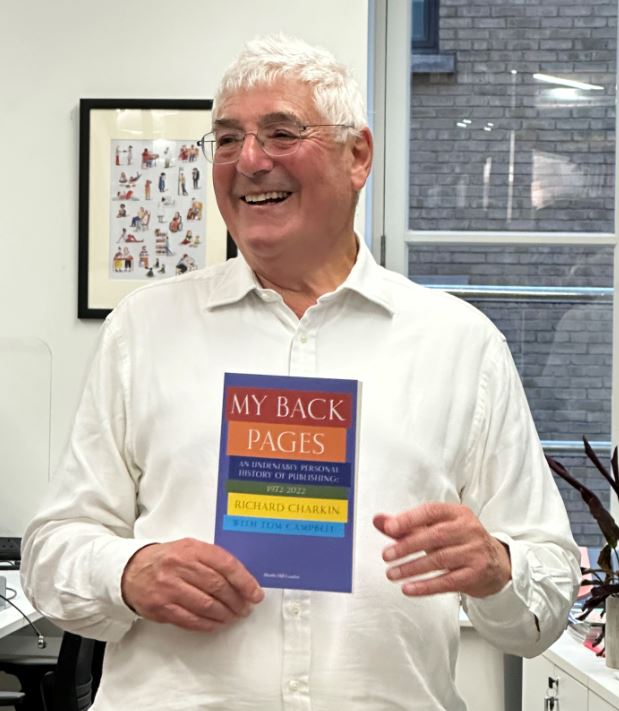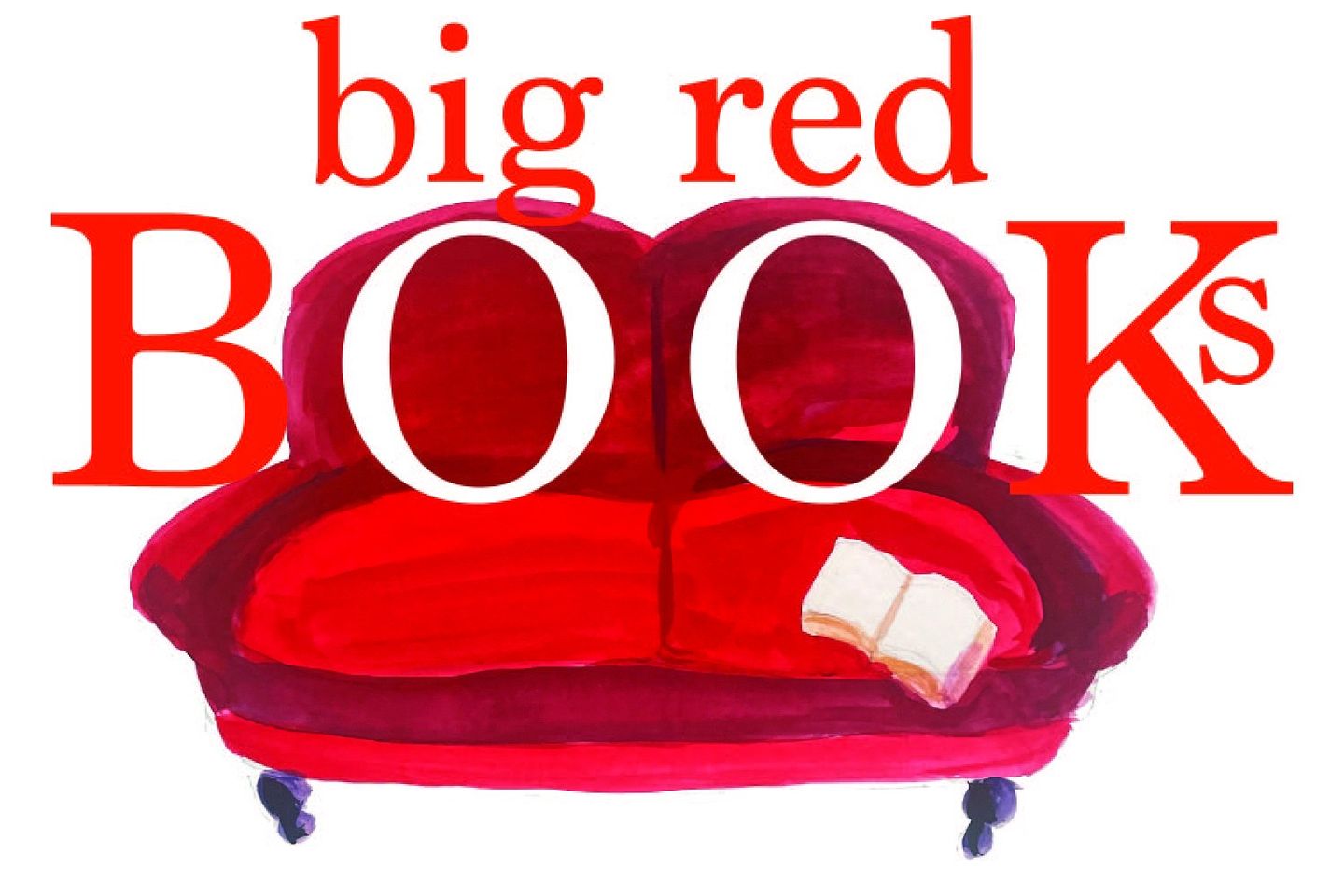 |
| Richard Charkin at the launch party in London for his memoir My Back Pages. |
For 50 years, Richard Charkin has been at different times a scientific and medical publisher, a journal publisher, a digital publisher, and a general publisher, and worked with such key figures as Robert Maxwell, Paul Hamlyn, Dieter von Holtzbrinck, Liz Calder, John Calder, Marjorie Scardino, and more. His employers have included Harrap, Pergamon Press, Oxford University Press, Reed International/Reed Elsevier, Bloomsbury, Macmillan, Current Science Group--a range of family-owned, publicly owned, university-owned companies, and start-ups. And he now has his own house, Mensch Publishing. In addition to many other activities, he has also been president of the International Publishers Association and president of the U.K.'s Publishers Association. He has unusually broad publishing experience and perhaps most important, he is a keen observer of book world trends--and has a great sense of humor. (We still laugh at his nickname for our mutual employer back in the day: Greed International.)
In his new memoir, My Back Pages: An Undeniably Personal History of Publishing, 1972-2022, written with Tom Campbell (Marble Hill Publishers, $30, 9781739265731), Charkin has a multitude of fascinating stories to tell about books, authors, publishers, and others. For example, the first title he published for a new paperback line at Reed was an early export edition of a U.S. import. "I knew to price it in line with the U.S. edition, but had no idea at all what the print run should be," he writes. "I hadn't long been out of academic publishing, and had never heard of the author or title. In the end, after a drink with a sales rep, we plumped for 10,000 copies. The book in question was The Silence of the Lambs by Thomas Harris and all of the copies duly sold, as did a further million or two after the release of the movie."
Charkin was also involved in the publication of Madonna's Sex, for which he had secured non-U.S. English rights. He recalls that as publicity built about the book, some printers and book people didn't want anything to do with it, and his mother worried that he would be arrested for pornography. He showed proofs to Paul Hamlyn, then chair of Reed. He recalls: "We examined the pictures in sombre silence, with his only comment being: 'I'm not at all keen on the one with the dog.' " Of course, the first two printings of 180,000 each quickly sold out, and now "the book is regarded as a classic of 1990s pop culture and today a first edition of Sex still in its wrapper sells for $1,000."
A different kind of book that Charkin is proud of is The Anatomy of the Dromedary, published more than 35 years ago while he was at Oxford University Press. "Probably the lowest selling book I was ever involved with," the title nonetheless was "the only anatomical guide to the one-humped camel (they are very difficult animals to dissect) and up until then there had never been a detailed study--nor, I think, has there been one since. In other words, the scientific community needed this book.... No one at OUP faced any kind of reprimand for publishing such an obvious commercial dud--it wasn't how editors were generally judged."
Throughout My Back Pages, Charkin recalls how the book world has changed in both small and profound ways. When he started, for example, most female staff were either in a typing pool or worked in administration, everyone could smoke in offices, sales data was often fuzzy, and "drinking culture" was widespread.
He has mostly positive things to say about how the business has changed. These include employing many more women and LGBTQ+ people, having better sales information, the use of computers and digital technology, lower barriers to publishing and writing, and more. Among the areas needing improvement, he notes that on publishing staffs in the U.K., there is still a class divide and some groups in society aren't well represented.
In terms of bookselling, he says that in the U.K. as in the U.S. that "the biggest thing that's happened is the Internet, which is Amazon." That led to a loss of many indie and chain bookshops in the U.K., although there has been "a slight bounceback" in indie bookshops in the last few years. The fact that so many indies continue to operate, he continues, is "a tribute to their adaptability and will to exist."
My Back Pages itself is a nod to changes in the book world: it's a print on demand title published by Marble Hill (a house founded by veteran publisher Francis Bennett, who founded Book Data, now part of Nielsen) via Ingram Spark. "We don't have to worry about reprints" and changes are easy to make, Charkin says. The book is being published simultaneously around the world and in a sustainable way.
With a bit of a shock, he says, too, that his book is not "horrid" about anyone in the business. In fact, he says that he feels "really warm about the industry. People kept asking who was the most important person in my career, and the truth is there isn't one. I was blessed with [knowing] a series of really good people who were nice to me and put up with all the crap." --John Mutter
 Big Red Books will open this summer at 120 Main St. in Nyack, N.Y. The Rockland County Business Journal reported that owner Richard Fulco is aiming to have his bookshop offer "personal service, knowledge of books, a human experience where along with a bookseller one enters the magical kingdom of letters and the written word."
Big Red Books will open this summer at 120 Main St. in Nyack, N.Y. The Rockland County Business Journal reported that owner Richard Fulco is aiming to have his bookshop offer "personal service, knowledge of books, a human experience where along with a bookseller one enters the magical kingdom of letters and the written word."











 Last week, employees at the
Last week, employees at the 



 National Hockey League playoff fever is in the air for some booksellers. Last night, the Carolina Hurricanes opened their second round playoff series at PNC Arena in Raleigh, N.C., with a 5-1 win versus the New Jersey Devils.
National Hockey League playoff fever is in the air for some booksellers. Last night, the Carolina Hurricanes opened their second round playoff series at PNC Arena in Raleigh, N.C., with a 5-1 win versus the New Jersey Devils.  Meanwhile
Meanwhile  Traitors Gate
Traitors Gate
 Rita Chang-Eppig's sharp, gritty first novel, Deep as the Sky, Red as the Sea, takes readers on a high-seas adventure alongside a legendary Chinese pirate queen who must reckon with government crackdowns on piracy and encroaching Europeans in the early 1800s.
Rita Chang-Eppig's sharp, gritty first novel, Deep as the Sky, Red as the Sea, takes readers on a high-seas adventure alongside a legendary Chinese pirate queen who must reckon with government crackdowns on piracy and encroaching Europeans in the early 1800s.